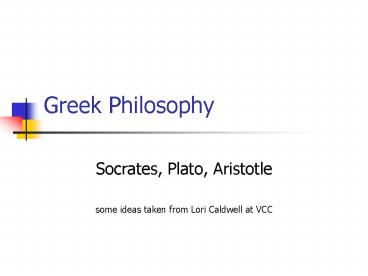Greek Philosophy - PowerPoint PPT Presentation
1 / 15
Title:
Greek Philosophy
Description:
Concerned with the fate of the individual and questioned traditional values. ... Plato's teachings and founded the Lyceum, another school to compete with the Academy. ... – PowerPoint PPT presentation
Number of Views:29
Avg rating:3.0/5.0
Title: Greek Philosophy
1
Greek Philosophy
- Socrates, Plato, Aristotle
- some ideas taken from Lori Caldwell at VCC
2
Socrates
- Wrote nothing down. Plato recorded his ideas.
- Inspired much of Western philosophy.
- Called himself a midwife to ideas.
- Concerned with the fate of the individual and
questioned traditional values. - Taught by Socratic Method questioning and
following the argument wherever it led. - Executed for corrupting the youth of Athens.
3
Plato
- Invented Socrates?
- Early writings probably Socrates ideas later
writings probably Platos original ideas written
in the voice of Socrates. - Founded the Academy, first permanent institution
of higher learning early university - Work deals with construction of an ideal society.
- Theory of Forms.
- Teacher of Aristotle.
4
Platos Republic
- Utopian society
- Guardians
- Warriors
- Artisans
- Theory of Forms
- Forms
- Number
- Mathematics
- Music
- Ideal educational system
5
The Allegory
- Prisoners are chained in a cave
- Face the back wall
- Cannot see themselves or each other
- There is a path where people travel
- Fire behind the road creates shadows
- Prisoners only see shadows on the wall
6
Allegory of the Cave
- Allegory a figurative story of a meaning
metaphorically implied, but not expressly stated - Plato has Socrates conceive the idea
7
Allegory of the Cave photo
8
The Truth
- A prisoner is forced to look at the true source
of the shadows. - He is pained and blinded by the light
- He prefers the deception of the shadows.
9
Other allegories
- The prisoner is forced up the ascent to the
outside toward the blinding light - Allegory of education
- The light blinds him, so he must first look at
shadows, then through trees. Finally he is able
to see the sun - Allegory of enlightenment
10
Platos Theory of Forms
11
Beauty The Form of Beauty
-
- The concept
of Beauty
-
An individual
beautiful entity - Imitation of a beautiful
entity
Beauty
12
Platos Forms
- Form of the Good
- Casts light over all the other Forms
- The Forms are the essences of things
- Plato does not trust empiricism or observation
- Without the Forms, we are limited to opinion
- Senses are not reliable to give true knowledge
- Knowledge comes from an examination of the Forms
13
Philosophy of The Republic
- Based on two presumptions
- Forms exist beyond the realm of the sensible
- They exist above such things
- Plato offers only common-sense arguments for
their existience - We have to believe the human mind is capable of
understanding the Forms - Platos view of the soul becomes important
because it supports this idea.
14
Platos philosophical Assumptions
- The world revealed by our senses is not the real
world - The real world can only be apprehended
intellectually. - Education consists in directing toward what is
real and allowing one to apprehend it. - The universe is ultimately good.
- Enlightened individuals have an obligation to the
rest of society.
15
Aristotle
- Broke away from Platos teachings and founded the
Lyceum, another school to compete with the
Academy. - Known as the great systematizer he classified
and wrote about all important topics of the day,
like Rhetoric , Logic, Poetics and Physics. - Science and philosophy must balance, not simply
choose between, the claims of empiricism(observati
on and sense experience) and formalism (rational
deduction). - Disputed Platos Theory of Forms in his book
Metaphysics. - Defined the nature of God as thought thinking of
itself and the Unmoved Mover. - Tutored Alexander the Great.
- Influenced the Roman orator Cicero and Catholic
theology of - St. Thomas Aquinas.





![[PDF] READ Free The Greek Way PowerPoint PPT Presentation](https://s3.amazonaws.com/images.powershow.com/10117953.th0.jpg?_=20240902072)

























